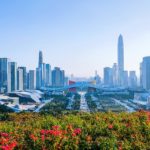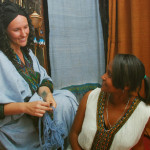The Peace Corps and Beyond: A Conversation with Kelly Branyik
Author, content designer, and world traveller Kelly Branyik returned from a two-year service in China with the Peace Corps in 2016. Since returning, she has launched a website, works as a copywriter and production coordinator, and authored a Peace Corps what-to-expect handbook: It Depends: A Guide to Peace Corps.
Kelly brings a fresh perspective to travel and has a breadth of knowledge in creative writing and service abroad. Travelbranyik.com is a place for readers to find Kelly’s work, travel tips (with extensive information about China), Peace Corps experience and resources, and information about her books. She is currently working on her next book, Wintersweet, a candid narrative of her life in China.
Kelly is a wealth of information for young travellers worldwide. I was eager to hear her perspective on travel, life, and the Peace Corps.
Your website grew out of a personal blog detailing your time as a Peace Corps volunteer in China. What are some of the obstacles you see in transitioning your website’s perspective from being Peace Corps based to also include travel in general, connecting with people, and your writing? What are your writing interests? How do you hope your website can connect travellers together?
I think I always wanted Travel Branyik to be more than Peace Corps. I could only carry on the Peace Corps knowledge and journey for so much longer. For a while there, I was using my former website, which focused a lot on Peace Corps, I always wanted to do more with it and talk more about traveling. It wasn’t too difficult to transition from my former blog to the newer blog. I was happy to make a new website that was more inclusive to me as a writer, traveler and Peace Corps Volunteer.
Actually, now that I have created Travel Branyik, I’ve felt more free to write than ever, and I have so many more ideas flowing and so many more things to share about things I’ve learned through travel. Lately, I have been very focused on writing blogs, writing my books, and freelance writing for a newspaper here in Colorado. But I hope to be like some of the big travel bloggers out there that encourage people to get out more and get a huge following. Everyone has their niche and I am working hard to build mine.
How does learning and knowing the local language change how you connect with a place? Are you still able to use Mandarin in your daily life?
I didn’t know Mandarin Chinese to begin with, and I struggled with the language for about six months before things started to really click and I was able to distinguish between words. When I learned the local language, it really started to help me understand people and culture more. It was what contributed to my success living abroad for as long as I did. It made traveling so much easier, too. It helped me learn how people talk to you, how they act toward you, and how language and culture intertwine. It’s much more different learning the language in depth than it is learning survival language.
I’ve been home nearly two years now, and I’m surprised I have retained most of the language. I still communicate with my friends and family members in China, but trying to use it here in the US is a tad awkward, especially in Colorado where the Chinese community is very small. I hope to get back into the language and use my language skills in the near future.
Your experience living in China is really unique – especially coming from the perspective of a young, American woman. What advice do you have for young travellers interested in going to places off the typical tourist trail or where they don’t know the language?
There is a lot of unknown in traveling to places off the beaten path and to a lot of people, that is incredibly intimidating and scary, but it’s also so invigorating and exciting once you do it when things like language barriers or cultural misunderstandings are in the way. I felt safe in China, so it was also very easy to travel alone and as a woman.
My first trip alone was to Beijing, and I remember the moment I felt brave and unstoppable as a solo female traveler. I was sitting at Houhai Lake at the Summer Palace and feeling like I could do this for a living. I was OK with Beijing but after living in Chongqing for so long, I felt Beijing was too touristy and less authentic than Chongqing. I preferred Chongqing to Beijing.
Traveling alone, and somewhere that isn’t very foreigner friendly, you run the risk of being illiterate, feeling vulnerable, but you also have the opportunity to find out what you’re made of as a traveler and a person and remove yourself from a comfort zone that wouldn’t allow you to challenge your perspectives or ways of understanding the world. My advice is to sort of just let it wash over you and be open to what can come to you on your travels. Don’t be afraid to try something new or do something that makes you nervous.
Author, content designer, and world traveller Kelly Branyik returned from a two-year service in China with the Peace Corps in 2016. Since returning, she has launched a website, works as a copywriter and production coordinator, and authored a Peace Corps what-to-expect handbook: It Depends: A Guide to Peace Corps.
How did travel fit into your life before the Peace Corps? What does travel mean to you now?
Mark Twain had a quote that said, “Travel is fatal to prejudice, bigotry, and narrow-mindedness, and many of our people need it sorely on these accounts. Broad, wholesome, charitable views of men and things cannot be acquired by vegetating in one little corner of the earth all one’s lifetime.” I loved that quote because it sums up how I felt about just how much travel had changed the way I look at the world.
I’ve been traveling since I was young. My parents took us on trips around the US from the time I was eight, up until I graduated from high school. We went somewhere every summer, whether it be to my mother’s family in Wisconsin, or to band camp in North Dakota. In between we took trips to California, Florida, and went camping every summer. My mother was really great at exposing us to everything outside of our hometown, which was incredibly small.
The first time I traveled alone was to Boston to see my sister, who went to Berklee School of Music, but I had never really tried international travel, although I dreamt of it as a child and spent significant amounts of time on the computer planning trips I couldn’t pay for.
My first trip abroad was through my university. I went to France and Spain. It was when I knew I needed to do this for a living and that I could do this for a living. It was the first time I remember realizing my dreams as a child were coming true. It was the first time my perspectives of the world and myself started changing. And then living in China for as long as I did, travel started to be more my strong desire to understand the world and the people better. I don’t think you always gain those understandings just by going on a 2-week vacation. Sometimes it includes putting the world under a microscope and throwing out everything you think you know about it so you can learn to love and understand people and culture better.
How has the reflection and writing process been different with your upcoming book Wintersweet – which details your own Peace Corps experience – than your first book, It Depends: A Peace Corps Guide?
It Depends was the first book I ever wrote all the way through, and I’ve learned so much between now and then. The guide was a lot less emotional than this next one will be. For Wintersweet, I’m a little scared of being so incredibly honest about who I was, how I changed, and things I did to grow and be a better person because it wasn’t always a beautiful picture, and such is life.
Wintersweet will be the very first creative non-fiction book I’ve written and probably the most honest I have ever been with anyone about my life. But I know this is an opportunity to talk about my journey in China in a way I hope everyone can understand. Verbalizing everything you have seen and done in Peace Corps is a difficult thing to do with your friends and family.
We’d love to hear about your experience re-entering your home community after the Peace Corps – what were some challenges? How were you different from the Kelly Branyik who left? What advice do you have for people returning from a long stay abroad?
I am a pretty emotional person as it is, so a lot of the shock I knew I would feel was resolved as soon as I arrived at that the airport and saw my family. I cried pretty hard in that moment. One thing that did happen after coming home was a lot of my old friends sort of disappeared from my life, and some others weren’t very thrilled about how much I had changed as a person because they had trouble relating to me.
Before I left for China, I was incredibly social, loud, and outgoing, but being a Peace Corps China Volunteer and living abroad was a humbling experience and it made me quieter and more introverted, which is something I can’t explain. In China, I would sit at tables in silence because the conversations were so rapid and I could contribute very little, but it taught me how to sit and listen more intently.
My time integrating back into US culture has never fully happened, and sometimes I don’t even know if it ever really will. I struggle with trying to communicate and feel understood and even understand my own self. The only two people I felt like were there with me through the whole journey were my parents. I FaceTimed with them at every chance I got, to tell them the good and the bad of the adventure. They are usually the people I go to when I struggle with internalizing how different I feel.
I think one of the things I came to accept after living abroad is you will be a little more isolated than before and there’s very little chance to leave that feeling. It makes sense why people who do live abroad for extended periods of time try to continue their lifestyles abroad. I think that if you have someone you are close to that you can rely on when you’re in those moments where you have trouble communicating, it’s best to rely on them. It also helps to find the communities that you can lean on as well.
But at some point, I believe we have to learn how to not live so much in the past and what was. We have to learn to move forward. It’s like a breakup! Which is something I talk about on my blog. We all have different ways of dealing with that, which is why I chose to write about it.









Thank you for featuring my story, once again! I am forever grateful for the opportunities you have given me to share my stories!